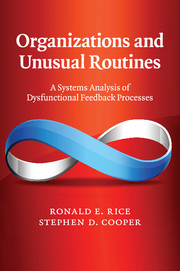Book contents
- Frontmatter
- Contents
- List of figures
- List of tables
- List of boxes
- Preface
- Acknowledgments
- 1 Crazy systems, Kafka circuits, and unusual routines
- 2 Causes, symptoms, and subroutines of unusual routines in six computer information/communication systems
- 3 Getting personal: unusual routines at the customer service interface
- 4 A multi-theoretical foundation for understanding unusual routines
- 5 A detailed case study of unusual routines
- 6 Summary and discussion of the case study results
- 7 Individual and organizational challenges to feedback
- 8 A multi-level and cross-disciplinary summary of concepts related to unusual routines
- 9 Recommendations for resolving and mitigating unusual routines and related phenomena
- 10 Summary and a tentative integrated model of unusual routines
- References
- Index
1 - Crazy systems, Kafka circuits, and unusual routines
Published online by Cambridge University Press: 10 January 2011
- Frontmatter
- Contents
- List of figures
- List of tables
- List of boxes
- Preface
- Acknowledgments
- 1 Crazy systems, Kafka circuits, and unusual routines
- 2 Causes, symptoms, and subroutines of unusual routines in six computer information/communication systems
- 3 Getting personal: unusual routines at the customer service interface
- 4 A multi-theoretical foundation for understanding unusual routines
- 5 A detailed case study of unusual routines
- 6 Summary and discussion of the case study results
- 7 Individual and organizational challenges to feedback
- 8 A multi-level and cross-disciplinary summary of concepts related to unusual routines
- 9 Recommendations for resolving and mitigating unusual routines and related phenomena
- 10 Summary and a tentative integrated model of unusual routines
- References
- Index
Summary
Two stories of mundane complexity and dysfunctional feedback
In most organizations (whether corporations, academic departments, retail stores, government agencies, hospitals), most everyone at least at some time is trying to improve, suffering from, attempting to avoid, or complaining about, some aspect of the organization or particular system. Unfortunately, the improving, suffering, avoiding, and complaining are rarely linked. After a while, complaints disappear as people develop workarounds or ways of overcoming, without solving, the problems, or avoid them, or disengage from the process, or displace the costs to others. But the tension and frustration percolates throughout the organization and its environment, and different people who have to interact with the system (employees, customers, technical support, administrators) continue to pay in varying psychological, professional, pedagogical, or just practical ways. Such interactions would seem nonsensical on the face of it: why would organization members regularly behave in ways that frustrate them, weaken their performance, or create other kinds of negative outcomes? And why should it prove so difficult for well-intentioned people to change such patterns? Consider these two stories, one a seemingly trivial frustration of daily life, the other a seemingly ineluctable feature of public bureaucracy.
Information
- Type
- Chapter
- Information
- Organizations and Unusual RoutinesA Systems Analysis of Dysfunctional Feedback Processes, pp. 1 - 20Publisher: Cambridge University PressPrint publication year: 2010
